By Lucy Komisar
Shaina Taub’s “Suffs” is the play I’ve been waiting for about the too-little talked about struggle for American women’s* right to vote. Asterisk: American white women, but a massive achievement none-the-less. Taub makes clear the internal conflict of the movement’s failure to recognize black women as partners.
The story’s book (by Taub) is all music (by Taub), rather like an operetta, the sung words (by Taub), with some biting humor. Leigh Silverman directs with equal attention to wit, beginning with an opening vaudeville satire, the women dressed as men (moustaches and top hats) harassing the suffragists. (It’s an all-female cast and if I get the names right, so is the orchestra.) The sound is a mix of Broadway and rock. The set is a wide expanse of gray steps and three huge gray pillars that reminds one of a court of justice.
Taub also plays the star of the stage and real-life drama, Alice Paul. She was 27 when she joined the suffrage organization founded by Susan B. Anthony and then led by her protégé, Carrie Chapman Catt (Jen Colella). Catt was a League of Women Voters type (even when they got the vote they didn’t change!) She wanted a conservative image, very “lady-like,” don’t raise your voice, use dignified tactics, and she built a national movement.
Alice had other ideas. As Taub strikingly portrays, her demeanor was passion. Taub dominates as Paul, though her singing is too contemporary in-your-face for my taste.
She reminded Catt that in 60 years, only eleven states, most in the west, had given women the vote. She wanted a women’s march on Washington for a federal amendment. Catt wanted to focus on New York State. But to placate her, she gave Paul an unused Washington office.
A figure I hadn’t heard of Inez Milholland, played by the sweet voiced Phillipa Soo, is an elegant, unconventional, accomplished (NYU Law School) activist who was a brilliant speaker. She was also a socialist, a labor lawyer and a war correspondent.
Paul organized the first protest march ever held in Washington, 8,000 women the day before Woodrow Wilson’s 1913 inauguration. Milholland led the Woman Suffrage Procession on horseback.
To avoid problems with southern whites, Paul agreed that black women wouldn’t be integrated in state groups, but would march separately. The black journalist Ida B Wells (Nikki M. James) does a powerful rendition of “Waiting My Turn.” “When will you white women ever learn. I had the same talk with Susan B Anthony 20 years ago. It’s not leadership Alice, its cowardice.”
Her response, “The country’s full of injustices. This fight is only for suffrage.”
Catt’s organization wasn’t better. Mary Church Terrell (Cassondra James) the head of a black women’s organization, was trotted out to make speeches, but that didn’t lead to raising the race issue.
The real villain was Woodrow Wilson. We know how the overrated Wilson instituted segregation in Washington. He also for years refused to support the suffrage amendment. Grace McLean is a terrific caricature of Wilson doing a soft shoe with spats and cane as he sings an egregiously sexist song “No one adores ladies more than I/ Ladies put the roses in my cheek/ I love them until they start to speak.”
Lest people forget, the opposition was ugly. There was hatred and threats. Police refused to protect protesters. But Paul and her collaborators keep on.
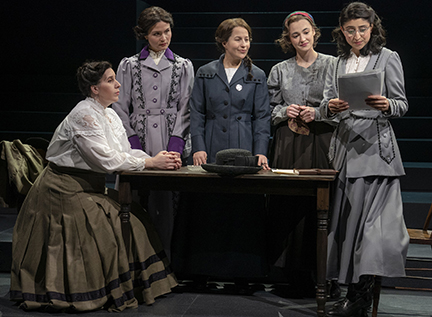
There’s a clever duet by Doris Stevens (understudy Mia Pak) and Dudley Malone (Tsilala Brock), a Wilson aide. “If we were married” runs through the disadvantages the wife would face: “our possessions and property would solely belong to the masculine spouse”/ “I’d always be pregnant because contraception’s a federal crime,” / but wife-beating wasn’t. Raises questions about another right that might soon be a crime.
I liked the valid historical appearance of rich donor Alva Belmont (Aisha de Haas). She would buy a Washington building for Paul’s headquarters. The Alva Belmont house is now a museum on Constitution Avenue.
The second act opening is another smart vaudeville satire: “unless you take action and soon, petticoat rule is coming for you…unspeakable horrors in store” when America is “feminized…the family will collapse.” Stunning how what anti-feminists said then is what they say today a century later.
Paul and several others are imprisoned for six months for obstructing traffic. Wilson ordered their arrest. They declare they are political prisoners. On hunger strike, they are forced fed with tubes, amounting to torture.
The FBI warns Ida Wells she will be arrested for treason if she continues her protests. The government had executed 13 black soldiers, falsely accused of crimes.
Eventually Paul and the others get out. The political authorities had tried to medically label her as crazy. She remarks, “Courage in women is often mistaken for insanity.”
Catt drinks tea with Wilson. She will be distraught when after the war he still doesn’t support the amendment: “We supported you!” He replies, “My hands are full with making peace in foreign lands.” The Alice Paul people were right, with their disdain shown by a monstrous Wilson puppet.
Finally — and the politics of this aren’t clear — Wilson asks Congress to support the amendment. Now it’s the fight for ratification. Tennessee will be the last, with a holdout’s mother persuading him to cast the tie-breaker. August 18, 1920, Wilson signed it behind closed doors. He didn’t invite suffragist leaders. No ceremony, no remarks, no women invited to witness, no photo of the signing that gave 27 million women the vote.
The Equal Rights Amendment (ERA) was Alice Paul’s next task, but the movement didn’t fare as well. The rightwing ramped up the same “threat to the family,” the Republicans ran with it and the Democrats never fought back. The ERA didn’t get the last five states. That needs another play to tell. Meanwhile, this is a superb production, both for its history and its artistry. Acclaim goes to Shaina Taub.
NB: In 1970-71, I was a national vice-president of the National Organization for Women, which campaigned for the ERA.
“Suffs.” Book, music, and lyrics by Shaina Taub. Choreography by Raja Feather Kelly, directed by Leigh Silverman Public Theater’s Newman Theater, 425 Lafayette St., NYC. (212) 967-7555. Running time 2:45. Opened April 6, 2022, extended to May 29, 2022. See review on New York Theatre-Wire.


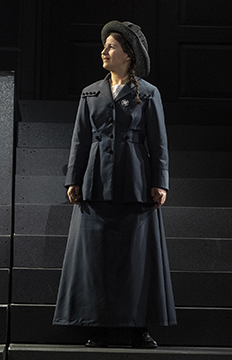
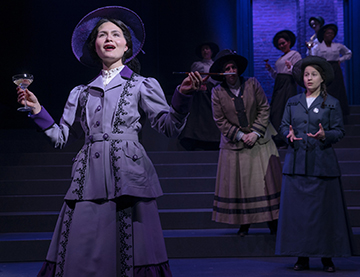
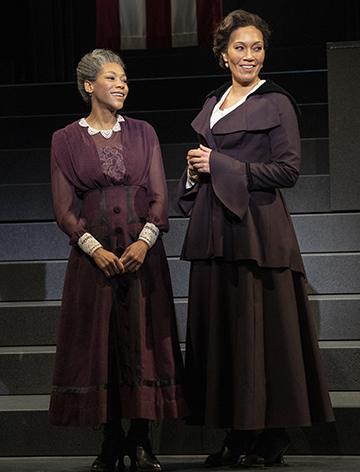
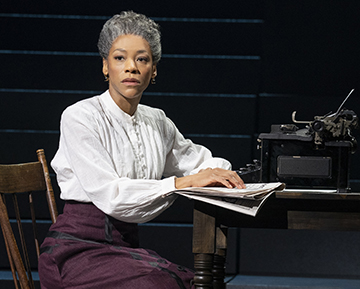
Lovely!